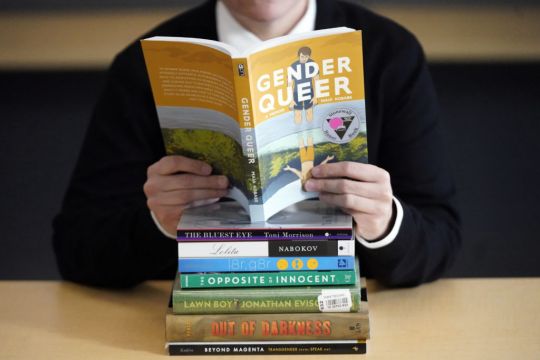Book bans and attempted bans continue to hit record highs in the US, according to the American Library Association (ALA).
It said the efforts now extend as much to public libraries as school-based libraries.
Through the first eights months of 2023, the ALA tracked 695 challenges to library materials and services, compared with 681 during the same time period last year, and a 20% jump in the number of “unique titles” involved to 1,915.
School libraries had long been the predominant target, but in 2023 reports have been near-equally divided between schools and libraries open to the general public, the ALA announced.
“The irony is that you had some censors who said that those who didn’t want books pulled from schools could just go to the public libraries,” said Deborah Caldwell-Stone, who directs the association’s Office for Intellectual Freedom.
The ALA defines a challenge as a “formal, written complaint filed with a library or school requesting that materials be removed because of content or appropriateness”.
In 2019, the last pre-pandemic year, the association recorded just 377 challenges, involving 566 titles.
The numbers fell in 2020, when many libraries were closed, but have since risen to the most in the association’s 20-plus year history of compiling data.
Because the totals are based on media accounts and reports submitted by librarians, the ALA regards its numbers as snapshots, with many incidents left unrecorded.
ALA's Office for Intellectual Freedom has released new preliminary data documenting a continued uptick in censorship attempts in libraries across the U.S. during the first 8 months of 2023. Read more: https://t.co/C2DHaz1SDT#UniteAgainstBookBans #FreePeopleReadFreely pic.twitter.com/niAaX0NNlv
Advertisement— American Library Association (@ALALibrary) September 20, 2023
Continuing a trend over the past two years, the challenges are increasingly directed against multiple titles.
In 2023, complaints about 100 or more works were recorded by the ALA in 11 US states, compared with six last year and none in 2021.
The most sweeping challenges often originate with such conservative organisations as Moms for Liberty, which has organised banning efforts nationwide and called for more parental control over books available to children.
“There used to be a roughly one-to-one ratio, where a parent would complain about an individual book, like in the days when many were objecting to Harry Potter,” Ms Caldwell-Stone said. “Now you have people turning up at meetings and asking that 100 titles be removed.”
The ALA released its numbers in advance of its annual banned books week, which is October 1-7, when libraries highlight challenged works.
Earlier this year, the association issued its annual top 10 list of the books most objected to in 2022, many of them featuring racial and/or LGBTQ themes.
Maia Kobabe’s Gender Queer topped the list, followed by George Johnson’s All Boys Aren’t Blue and Nobel laureate Toni Morrison’s The Bluest Eye.







